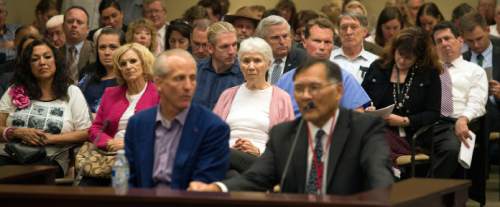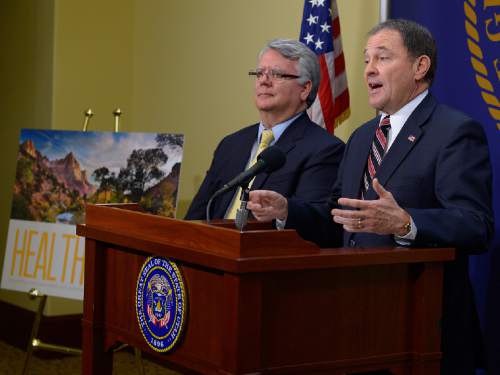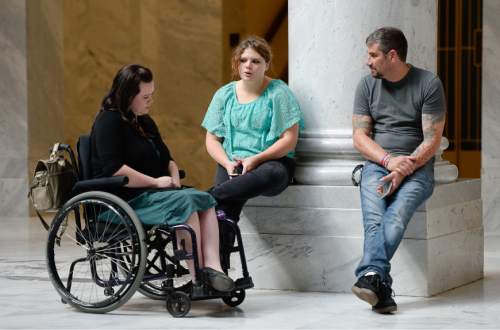This is an archived article that was published on sltrib.com in 2015, and information in the article may be outdated. It is provided only for personal research purposes and may not be reprinted.
Gov. Gary Herbert appears content to let the Legislature try its hand at crafting an acceptable plan to help low-income Utahns get access to health care, after six months of closed-door negotiations yielded a proposal that made a resounding thud.
"I think the issue is not going to go away, but we've tried the best we can," Herbert said in an interview. "I hope there's another pathway forward, but it's really up to the Legislature to find something they're willing to pass. … I expect that [legislative] leadership will find a way."
Herbert said he has proposed what he thinks is the best solution, Healthy Utah, which would have used $78 million in state money to subsidize insurance for 125,000 of Utah's poor, but it was rejected by the House in March.
Then came Utah Access Plus, an alternate proposal put together by Herbert and House and Senate leaders. It was trashed by lawmakers in both bodies.
The governor said solving the problem is now out of his hands.
Herbert huddled with Senate President Wayne Niederhauser, R-Sandy, and House Speaker Greg Hughes, R-Draper, Wednesday afternoon to discuss potential next steps and possibly set up the next impasse.
Hughes said the meeting was mostly a "debrief" — to discuss the feedback leaders received from senators and representatives and the public — more than planning any next steps.
"We're not going to give up on some solution, but there won't be a special session and we'll deal with this during the regular session," which begins in January, Niederhauser said. "I think we're going to give it a break before we get back into it. I think it's going to take a different approach and a more legislative approach."
Just 10 House Republicans were willing to back Herbert's Healthy Utah proposal when it came up for a vote in March, and on Tuesday in a closed-door House GOP caucus, seven threw their support behind Utah Access Plus. In the Senate, which passed Healthy Utah during the legislative session, Utah Access Plus also came up well-short of the 15 votes needed for passage in a closed-door caucus.
The major difference between the plans was that Utah Access Plus would have levied $52 million in taxes and fees on doctors, hospitals and pharmaceutical companies to draw $450 million in federal match. Both plans would have used the federal funds — already being paid by Utah taxpayers — to provide insurance to the same 125,000 people.
"We still have interest in looking at those in the coverage gap and providing care," Hughes said. "I don't believe there will be any special session, but I believe there's a willingness and I believe there will be work on how to provide care to the Utahns who don't have it and can't afford it."
Hughes said earlier that he believes there is a willingness in the House to cover the poorest of the poor, those making less than the poverty level.
House Majority Whip Francis Gibson, R-Mapleton, suggested that could be done through a plan similar to the Utah Cares proposal put forward during the legislative session by House Majority Leader Jim Dunnigan, R-Taylorsville.
That plan would cost about $32 million a year, but it would bring back much less federal money — about $82 million total — and provide a much lower level of coverage to about 31,000 low-income Utahns.
The advantage, Gibson said, is that the plan would be more sustainable and give the state more flexibility to dictate the terms of the coverage. It also would not provide new benefits to people who already have access to insurance — something Healthy Utah and Utah Access Plus would have done.
Earlier this year, the House passed the Utah Cares proposal 56-18 and likely would support the proposal again. The Senate did not vote on the Utah Cares plan.
Herbert disliked the plan during the session and said Wednesday that he would not be inclined to support it now.
"The argument has been [that] it's better than nothing. But not much," Herbert said. "It seems we're spending a lot more money and getting a lot less benefit. So, to me, I don't quite understand that approach. It seems we ought to find something better than that," he said.
Niederhauser said the Utah Cares proposal will be on the table if it can pass the House and "gives relief to those in the coverage gap."
RyLee Curtis, a Medicaid analyst with the Utah Health Policy Project, said she has been encouraged to hear Herbert, Hughes and Niederhauser say there is a need to cover low-income residents and that the issue isn't going away.
"We need to make sure they continue to work on the issues," she said. "They are elected officials, and we elect them to solve Utah issues and this issue is one of the biggest we have faced since implementation of Medicare and Medicaid."
gehrke@sltrib.com Twitter: @RobertGehrke







